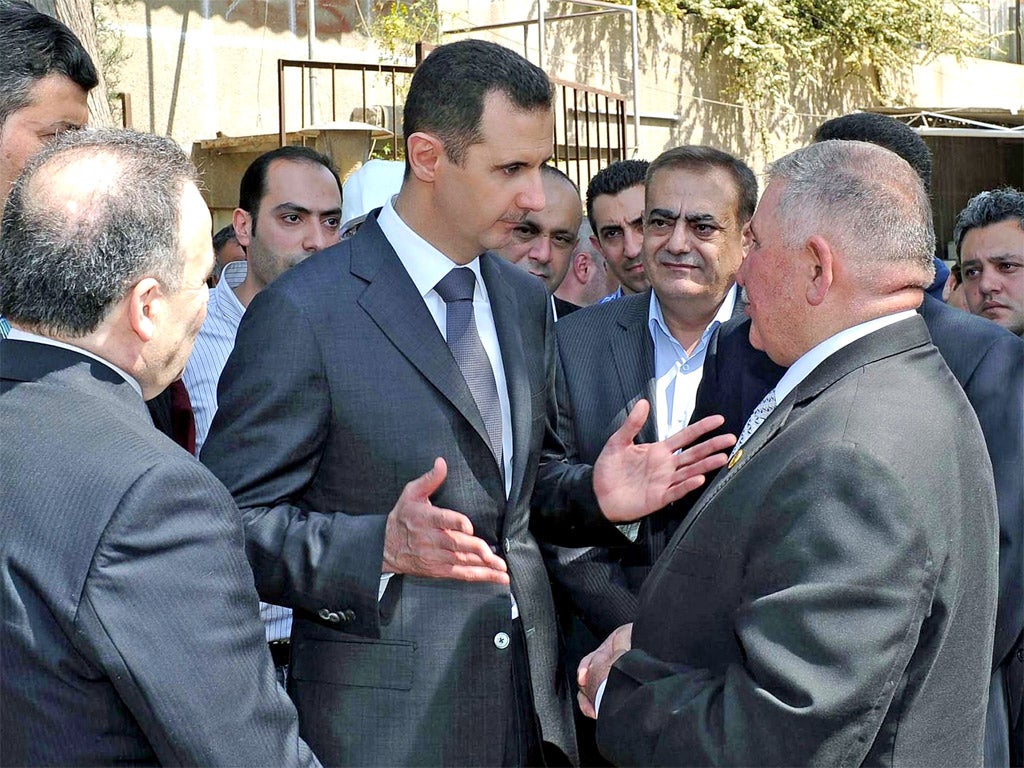Faith in Syria's rebel army moves President Obama a step closer to giving arms
President seeks proof of how chemical weapons were used in Syria before taking major decision

Your support helps us to tell the story
From reproductive rights to climate change to Big Tech, The Independent is on the ground when the story is developing. Whether it's investigating the financials of Elon Musk's pro-Trump PAC or producing our latest documentary, 'The A Word', which shines a light on the American women fighting for reproductive rights, we know how important it is to parse out the facts from the messaging.
At such a critical moment in US history, we need reporters on the ground. Your donation allows us to keep sending journalists to speak to both sides of the story.
The Independent is trusted by Americans across the entire political spectrum. And unlike many other quality news outlets, we choose not to lock Americans out of our reporting and analysis with paywalls. We believe quality journalism should be available to everyone, paid for by those who can afford it.
Your support makes all the difference.The Obama administration is reported to be considering supplying lethal weapons to the Syrian rebel forces.
The US has thus far held back from supplying military hardware to the rebels for fear that they could end up in the hands of radical groups. But recent contacts with the Syrian opposition have made the White House more confident about certain rebel factions, and preliminary evidence of the use of chemical weapons inside the country have reportedly led Washington to consider changing its policy.
While it remains unclear what kind of equipment the US might provide, President Barack Obama is likely to make a decision on supplying arms ahead of a June meeting with Russia’s President Vladimir Putin, a key supporter of the Assad regime, according to a report in The Washington Post.
The suggestion of a shift in US policy came as President Bashar al-Assad visited a Damascus power station, a rare public appearance that came just a day after the Syrian capital was rocked by a bomb. The Associated Press said that at least 14 people were killed in the explosion – the second devastating explosion to hit central Damascus in as many days.
In Washington the growing violence is pressuring the government into considering policy changes that would see it play a more active role in the conflict. Supplying arms would bring the US in line with allies such as Saudi Arabia and Qatar. But the Obama administration remains cautious and continues to pursue diplomatic avenues, with the country’s top diplomat, Secretary of State John Kerry, due to travel to Moscow early next week as the Americans look to bring the Russian government on to their side. Mr Kerry is expected to meet both his Russian counterpart Sergei Lavrov and President Putin.
Evidence of chemical weapons use is likely to be a key plank of the case that the US makes to the Russians in order to convince them to withdraw their support for the Syrian government. Although the American officials have been cautious about blaming the Assad regime for using such weapons, it is known to have stockpiled chemical arms. Speaking at the White House earlier this week, President Obama said that “if we end up rushing to judgment without hard, effective evidence, then we can find ourselves in the position where we can’t mobilise the international community to support what we do.
“What we now have is evidence that chemical weapons have been used inside of Syria, but we don’t know how they were used, when they were used, [or] who used them. We don’t have chain of custody that establishes what exactly happened,” he said, adding that he had to make sure that he had all the facts before considering “the potential for taking additional action in response.”
“If I can establish, in a way that [makes] the United States [and] the international community feel confident, the use of chemical weapons by the Assad regime, then that is a game-changer,” the President said, citing the possibility then of “even more devastating attacks on civilians” and the risk of those weapons falling into the wrong hands.
Despite the caveats, a senior US official told The Washington Post that “we’re clearly on an upward trajectory. We’ve moved over to assistance that has a direct military purpose.”
Hezbollah leader vows to stop rebel forces taking over Syria
The Hezbollah leader Sayyed Hassan Nasrallah has said that Syria’s allies in the region and the world would not allow it to fall “into the hands of Americans, Israel and [Sunni] extremists”.
Mr Nasrallah, a staunch ally of President Bashar al-Assad, said in a televised speech from an undisclosed location that Syrian rebels fighting the regime’s forces would not be able to topple him using force.
“The battle is long … We tell you [Syrian rebels] that you will not be able to bring this regime down through military means,” he said.
Rebels have long accused Hezbollah of fighting alongside Mr Assad’s forces. The group has formally denied this, and said it was only fighting to protect Shia villages along the border with Lebanon. However on Tuesday Mr Nasrallah admitted that Hezbollah fighters had been killed in Syria. But reports of the death toll were “exaggerated”, he added.
He also left the door open to greater participation in the conflict “if the situation escalates more”.
Fighting between Hezbollah-backed Shia militants and Syrian rebels has raged in border villages in recent weeks, threatening to drag Lebanon into the conflict. The border area is a key supply line for the rebels, making it important for Hezbollah to stop them taking over Shia villages there that would bring them close to Hermel, one of the group’s strongholds.
Join our commenting forum
Join thought-provoking conversations, follow other Independent readers and see their replies
Comments